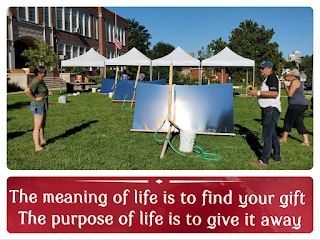#Count _everything_ you can be inspired by. This addresses directly how to define _great_.
One of the hardest, yet most important, lessons ever learned.
"Eu nu ți-aș dori vreodată să ajungi să ne cunoști."
[A more complete quote:
"- … Şi, purtat de biruinţă, să mă-mpiedec de-un moşneag?
- De-un moşneag, da, împărate, căci moşneagul ce priveşti
Nu e om de rând, el este domnul Ţării Româneşti.
Eu nu ţi-aş dori vrodată să ajungi să ne cunoşti,
Nici ca Dunărea să-nece spumegând a tale oşti.
După vremuri mulţi veniră, începând cu acel oaspe,
Ce din vechi se pomeneşte, cu Dariu a lui Istaspe;
Mulţi durară, după vremuri, peste Dunăre vrun pod,
De-au trecut cu spaima lumii şi mulţime de norod;
Împăraţi pe care lumea nu putea să-i mai încapă
Au venit şi-n ţara noastră de-au cerut pământ şi apă -
Şi nu voi ca să mă laud, nici că voi să te-nspăimânt,
Cum veniră, se fă*ă toţi o apă ş-un pământ.
Te făleşti că înainte-ţi răsturnat-ai valvârtej
Oştile leite-n zale de-mpăraţi şi de viteji?
Tu te lauzi că Apusul înainte ţi s-a pus?...
Ce-i mâna pe ei în luptă, ce-au voit acel Apus?
Laurii voiau să-i smulgă de pe funtea ta de fier,
A credinţei biruinţă căta orice cavaler.
Eu? Îmi apăr sărăcia şi nevoile şi neamul...
Şi de-aceea _tot ce mişcă-n ţara asta, râul, ramul_,
Mi-e prieten numai mie, iară ţie duşman este,
Duşmănit vei fi de toate, făr-a prinde chiar de veste;
N-avem oşti, dară iubirea de moşie e un zid
Care nu se-nfiorează de-a ta faimă, Baiazid!"—Mihai Eminescu, Scrisoarea a treia.]
This here and now is betting on our unfair advantage in the world. As Free Dacians. (Born and taught in Romanian—at least partially, if lucky enough in this world—, and hence able to read or hear and comprehend in the Romanian language.)
It is quite a select club, us knowers of the Romanian language. As I suggested earlier, I _had to_ get to Texas. When I got there, a fine gentleman told me he self taught himself (sufficient) Romanian to be able to read Mihai Eminescu. The brilliant words spoken just for here and now in our #️⃣🧛♂️ series are included. In comments you'll find a link to the written translation into English—yet it's never the same thing.
The science of why this matters—constructal law—follows tomorrow (at [9]).
In memory of Donald T Campbell and Paul Y Hammond. 🙏
Follow in the footsteps of the great.
Look inside.
Repeat.
[8]
Mihai Eminescu—Scrisoarea a treia.
Romanian language.
https://m.versuri.ro/versuri/mihai-eminescu-scrisoarea-iii-_h617.html
English translation.
Letter III - excerpt [Scrisoarea III - fragment]
"There! A peace envoy is coming with a kerchief on a stick Bayezid, watching him closely, a fierce quarrel wants to pick:
– What'd you want?
– We? Peace and quiet! And if you are not hostile
Our prince would like to chatter with Your Highness for a while.
At a sign, they let him enter and draws near, the tent to reach,
An old man dressed in plain garments, with a simple lovely speech.
– Are you Mircea?
– Yes, Your Highness!
– I demand you to kneel down,
Or I'll lay upon your forehead a disgraceful thorny crown.
– I don't really mind, Your Highness, why you've come and what you do, While we are at peace, however, I shall warmly welcome you. [...]"
Further, here (pp. 57-59):
https://www.researchgate.net/publication/354311216_Mihai_Eminescu_-_50_Poems_Translated_into_English_by_Octavian_Cocos
We take the opportunity to introduce the reader to even more MIhai Eminescu, in English. Enjoy.
Adrian S. Petrescu, Ph.D., J.D.Chief Future Architect, InnovationTrek
We got here. What's next?
Accelerate Innovation.
In companies and self.
Grow flow. Naturally.
ASPetrescu@InnovationTrek.org







